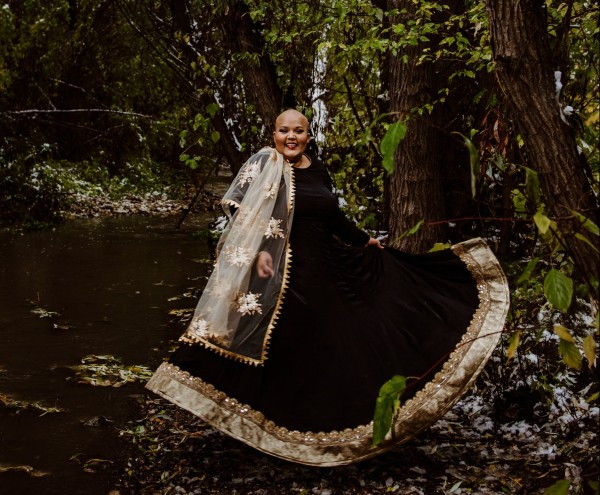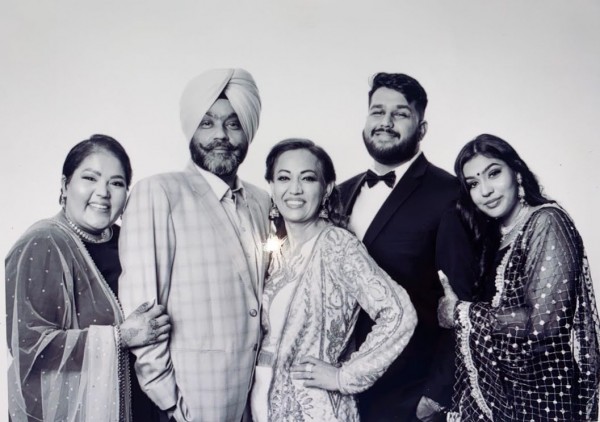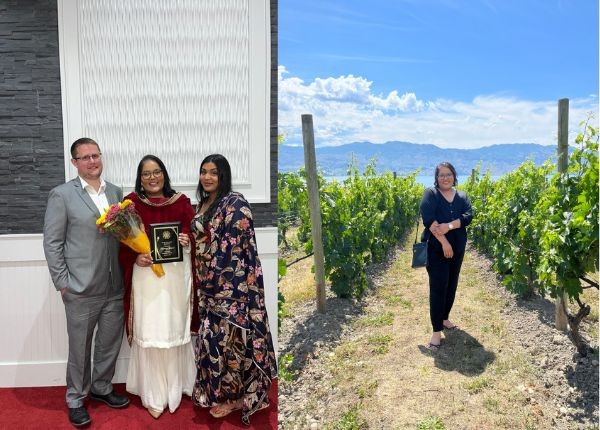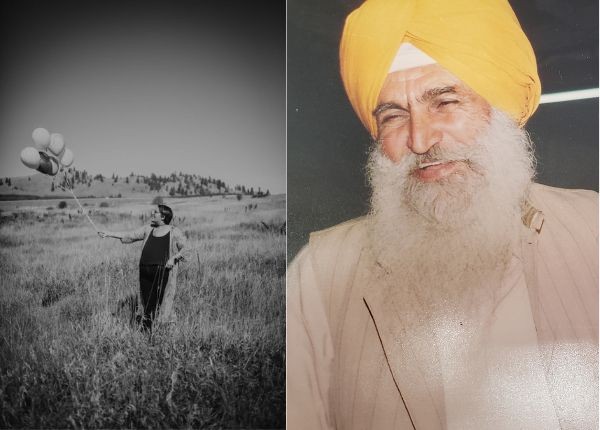

Naaz Kaur Grewal (she/her), a Master of Clinical Social Work student and Breast Cancer Warrior, is the visionary behind Chaa da Cup with Harnaaz Kaur Grewal. Residing in the picturesque traditional and unceded lands of the Syilx Okanagan people (colonially known as Vernon, BC), Naaz embarked on a journey driven by the belief in transparent qualitative research. Her work unravels the intricate relationships between racism, race, gender, intergenerational trauma, and intersecting identities.
Naaz’s passion lies in enlightening others about the cultural bottlenecks created by systemic racism and the formidable barriers faced by racialized Canadians, particularly South Asian women. Her project was conceived with the noble purpose of empowering and amplifying the voices of South Asian women who have long been absent from mainstream discourse. The inaugural photo exhibit of Chaa da Cup became a platform to celebrate these women, marking the beginning of an inspiring advocacy brand.
With unwavering determination, Naaz Kaur Grewal strives to carry forward her mission, extending support to the voices of other equity-seeking and marginalized populations across the country.
Tell us about your journey? How did you get involved in your industry?
After completing high school, I enrolled in the Bachelor of Science degree at UBC-Okanagan with the ambition of becoming a doctor…but fate had another destiny in mind for me.
On July 20, 2020, I entered the doctor’s office expecting a routine check-up. Instead, my doctor uttered the words, “Naaz, I am so sorry, but you have cancer.” You heard that right…the person studying to become a doctor had become the patient. What followed was years of aggressive chemotherapy, radiation treatment, numerous surgeries, and mental distress…all while a global pandemic shut down the world.
What helped me through this were the connections I had with the people around me, including my fellow cancer warriors, my family and friends, my fiancée, and the medical staff at the Vernon Hospital. The medicines kept me alive, but it was the human connection that helped me thrive. It was within that journey that I discovered the field of social work. While I was on my own path towards medicine, I somehow tripped, was spun around, and planted into this new field. As a prospective social worker, I am committed to providing a space where voices can be heard and amplified, advocating for equitable and fair access to public services, and challenging the systemic barriers and injustices faced by equity-seeking and marginalized populations.
What is the hardest challenge you have come up against in your personal/professional life? What was your biggest lesson learned?
At the age of 25, I was diagnosed with Stage 3 Triple Negative Breast Cancer during the COVID-19 pandemic. I was set to accept my admission letter to grad school at UBC and had just accepted a new position at work. However, due to the nature of the disease, I was told by my oncologists to put everything on pause. But, if you know me, ‘pausing’ is not something I do; it’s just not in my nature. I went against my medical team’s orders and pursued a part-time education while also working part-time. I was thankful for the support I received from those around me because none of this would have been possible without their flexibility. While I don’t recommend this to everyone, I knew I had to keep busy. Otherwise, I would be stuck at home, ruminating in turmoil. During my battle with cancer, I learned how valuable life can be and how precious the small moments are. I couldn’t do the finer things in life, such as waking up and having a cup of coffee (and I am addicted to caffeine!). I also learned the strength and resilience I have to persevere. With that resilience, I can do the work I do now. Cancer tried to steal my life, so I kicked its ass!
What advice would you give South Asian women wanting to do what you do?
The best piece of advice I can give I received from one of my professors: As social workers, all we can do is add one drop to someone’s glass. Sometimes it’s the first drop that’s ever beenadded. Sometimes it’s the last drop they need. The work is demanding, especially for IBPOC social workers. There isn’t enough representation of South Asian women in the field, and the need is dire. You may feel like you need to solve every problem people face in the world and conquer every battle, but that can and will lead to burnout. We cannot fix this world alone, so find like-minded people doing the work you do and collaborate with them. But most importantly, take care of yourself. Many people are going to rely on you, but how can you help others if you cannot help yourself first?
What does “women empowering women” mean to you?
The path for women, predominantly South Asian and other racialized women, is not a straightforward one. Society and people put forth barriers as women progress in life. I believe true empowerment means women supporting others in lifting those barriers…even if they don’t experience the obstacles themselves. It means showing up for one another, providing a shoulder to lean on, and advocating for women that may not have the privileges you have in life.
We often hear stories in our culture about how boys are celebrated and favored. I was fortunate enough to have Punjabi parents that always fought against that. They celebrated when their daughters were born and distributed ladoos. They never pressured me to get married. They always supported my post-secondary education which is a privilege not all women in our culture get to experience. So as a way to support my fellow South Asian women, I continue to fight against the stigma and restrictions put forth. I help amplify the voices of women through my project. South Asian women have so much to offer; sometimes, we aren’t given a chance. So to all my South Asian women, continue fighting against the barriers and supporting each other!
If you could tell your teenage self something, what would it be?
Oh boy, there are so many things I wish I could tell myself! If I had to choose just one, I would say that a day will come when you lose your best friend, your Babaji, so cherish everyone like it’s their last day.
What is your personal motto or mission statement?
In the face of darkness, there will always be light. I know it sounds cheesy, but having gone through dark periods of my life, like cancer and losing my Babaji and brother, I realized that I can and will continue to persevere. It might require some love and help from others, but those are the ones that bring in the light when you are in the darkness.
Besides your work, what are you passionate about?
Living in the beautiful city of Vernon, I am surrounded by mountains, trees, and beaches. Being surrounded by nature’s beauty, I try to take any opportunity I can. I love sitting on the dock with my feet in the water or ATVing with my fiancée. I am also passionate about supporting the next generation of South Asian women by helping reduce the barriers they may experience and working towards a world where, one day, the future generation is no longer limited because of racism and discrimination.
Where can one find you on your days off?
In recent years I have become more of a homebody, so on days off, you can usually find me at home reading a book, catching up on some Netflix, or gaming…and always with a yummy charcuterie board ready to go. If I am not at home, I am exploring all the restaurants and eateries the Okanagan has to offer.
How do you balance work, life, and family?
I don’t know if I have entirely found that balance yet. I start every day with a cup of coffee and map out my to-do list. Because I am not the best at taking breaks, I have begun to add it to my calendar as a way to hold myself accountable. Having gone through the physical health battles I did, I always listen to my body first. If my body tells me to slowdown, I will do just that. There are times when I feel guilty for stopping (it’s that immigrant mentality, I tell ya), but I am reminded that even the fiercest of people need a break too. During that time, I usually catch up with my family and friends, check in with my sister (believe it or not, we call each other almost every day!), and get some cat cuddles.
Upcoming Projects
The MSW program can be quite accelerated, but I want to do this project and its participants justice. So, I have plans to expand Chaa da Cup after I graduate and hold more sessions, especially with South Asian males and youth. In the meantime, I will continue to spread the voices of the powerful women who trusted me in sharing their stories and continue fighting against the injustices experienced. I also hope to create a social media platform…and, who knows, maybe even a podcast?
Stay connected with Naaz
- Email: Harnaaz@chaadacup.ca
- Facebook Page: @harnaaz.grewal
- LinkedIn: Naaz Grewal
Chaa da Cup is currently on Himmat Media’s website. For more information about the project and to check out all the fantastic work Himmat Media is up to please click on this link: https://www.himmat.media/chaa-da-cup



